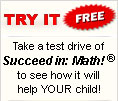Dyscalculia Symptoms In Children – Signs To Look For
If you suspect your child has dyscalculia, you’ve most likely noticed some concerns of the learning disability. This article is meant to be used as a guide, and certainly NOT the deciding factor in the sole diagnosis of dyscalculia.
Dyscalculia Symptoms In Children
- Has frequent difficulty with arithmetic
- If your child has difficulty with everyday tasks, such as reading an analog clock
- The inability to understand budgeting or financial planning even at a basic level. (An example of this would be estimating the cost of the items in a shopping cart, or balancing a checkbook
- Has difficulty with subtraction-tables, addition tables,mental arithmetic multiplication-tables, division tables,etc.
- Problems with differentiating between right and left
- Inability to visualize mentally (remembering and recognizing shapes is an example)
- Often unable to grasp and remember mathematical concepts, rules, formulae, and sequences
- Inability to concentrate on mentally intensive tasks
- More Dyscalculia Symptoms
(Have your child take the online dyscalculia test here.)
While the above symptoms are not inclusive and are not meant to be a diagnosis, they are some of the big things to look for. There are many other signs your child might exhibit if they truly have dyscalculia. The best thing to do is talk to your child’s teacher and discuss what they observe during the day. If you come to conclusion that your child has dyscalculia, there are many ways to help your child overcome it. Software programs that are disguised as games can be a great way to help your child in recognizing and becoming more comfortable with math.
Tips for Helping Your Child
As a parent our children come first. Period. It breaks our hearts to even think about our children going through a difficult time. Being there for your child and understanding is the best support we can give them. Finding other ways to promote their self esteem really goes a long way. If they are really good at drawing or reading, focus on saying positive things to them, and compliment them on what they do really well. This will help to counter act some of the negative feelings they may have about their learning disability.
Helping them to feel normal will enable them to face dyscalculia head on, because they’ll feel confident in other areas of their life.
